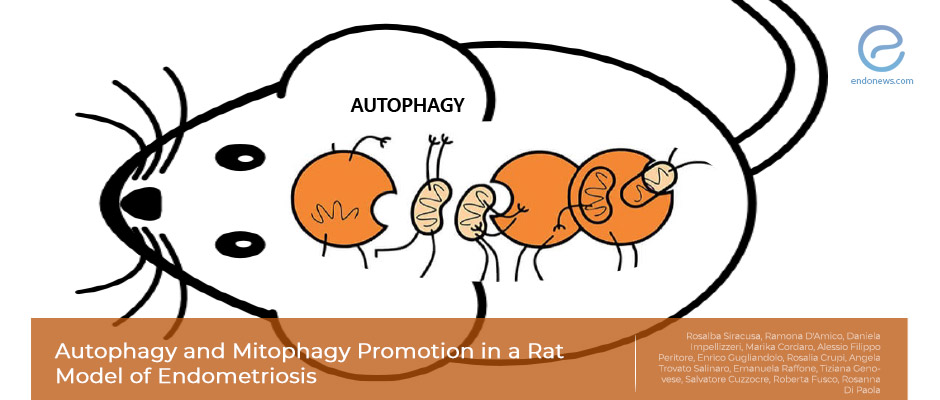New molecular insights in endometriosis pathogenesis
Jul 26, 2021
Autophagy and mitophagy have roles in endometriosis pathogenesis
Key Points
Highlights:
- Investigations pointing out alterations in autophagy and mitophagy (i.e., mitochondrial autophagy) at the cellular level favor the formation of endometriosis.
What’s done here:
- Endometriosis induced by uterine fragment injection to female laboratory rats.
- Rapamycin, a macrocyclic antibiotic, was administered once per week in the experimental arm, and the vehicle was used as a control arm.
- Endometriotic implants were obtained by laparotomy for histopathological assessment, autophagy, and angiogenesis.
Key results:
- Endometriosis histological score, volume, diameter, and area were reduced in the Rapamycin arm compared to the vehicle group, while sham animals did not show any implants.
- Evaluation of the autophagy pathway revealed that vehicle groups showed high p-AKT and mTOR, and low Bnip3, Ambra1, and Parkin expressions, demonstrating impaired autophagy and mitophagy.
- Rapamycin administration induced a significant reduction in p-AKT and mTOR proteins and increased Beclin and microtubule-associated protein expressions activating both mechanisms.
- Rapamycin administration not only increased apoptosis which was assessed by Bcl-2, Bax, and Cleaved-caspase 3, also reduced the angiogenesis which was assessed by vascular endothelial growth factor and CD34 in the lesions.
Limitations:
- This animal model of endometriosis is not an exact equivalent of human disease.
- The data revealed in this experimental model using rapamycin may not be fully extrapolated to human disease:
- Rats do not menstruate.
- Lesions are no spontaneous.
Lay Summary
Dr. Rosalba Siracusa and associates from Messina University, Italy, have published their research on cellular pathogenesis of experimental endometriotic lesions in the recent issue of the "International Journal of Molecular Sciences".
Endometriosis is a debilitating chronic estrogen-dependent inflammatory condition and it is the third cause of hospitalization in the USA. There are several published molecular research papers that show alterations in autophagy and mitophagy in endometriosis pathogenesis. In particular, altered autophagic flux induces changes in cellular survival, and it has been demonstrated in vivo experiments that the inhibition of autophagy by increasing extracellular signal-regulated kinase (ERK), mammalian target of rapamycin (mTOR) further downregulates apoptosis in endometriosis.
Following endometriosis induction in female laboratory rats, the authors administered rapamycin, which blocks a critical autophagy inhibitor, mammalian target of rapamycin (mTOR). Endometriotic implants obtained by laparotomy were histopathologically assessed and were evaluated for alterations in autophagy and angiogenesis pathways. Apoptosis was analyzed by Bcl-2, Bax, cleaved caspase 3; and angiogenesis was evaluated by VEGF and CD34 molecules.
Rapamycin administration resulted in activation of autophagy and mitophagy, with increased apoptosis and reduced angiogenesis in the endometriosis lesions. However, targeting the mTOR axis with rapamycin or similar existing drugs is not acceptable for endometriosis management at the time being, due to the side effects and its ubiquitous role.
As the main conclusion of this study, it can be proposed that the development of endometriotic lesions requires impaired autophagy and mitophagy. Alterations of these molecular pathways result in the inhibition of apoptosis and increased angiogenesis, all of which facilitating the fertile milieu for endometriosis.
Even though being a sophisticated experimental design, this animal model of endometriosis is not an exact equivalent of human disease. The data revealed in this experimental model using rapamycin may not represent a full extrapolation of human disease.
Research Source: https://pubmed.ncbi.nlm.nih.gov/34064854/
animal model molecular endometriosis autophagy mitophagy rapamycin angiogenesis

